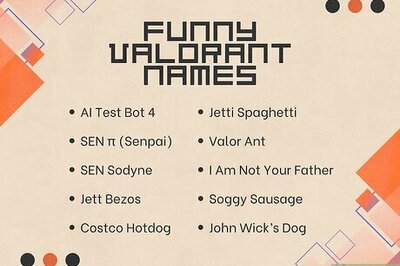
views
The Delhi High Court on Tuesday laid down guidelines to be followed by courts while dealing with cases related to removal of objectionable content from the internet to ensure access to such offensive material is restricted at the earliest and it is not re-posted anywhere else by others. The guidelines or template of directions were laid down by Justice AJ Bhambhani while dealing with a matter in which a woman's photographs were uploaded on a pornographic website by some miscreants and despite court orders the content could not be removed in entirety from the world-wide-web and "errant parties merrily continued" to re-post and redirect the same to other sites.
The court directed the police to ensure the offending content was removed and directions were also issued to search engines, like Google, Yahoo and Bing, "to globally de-index and de-reference" the offending content from their search results. It directed search engines to endeavour to use automated tools, to proactively identify and globally disable access to any content which is exactly identical to the offending content, that may appear on any other websites/online platforms. "The internet never sleeps and the internet never forgets," the court said referring to the case and added that it cannot resign itself to "a cat-and-mouse game of errant parties evading orders by re-posting offending content across the world-wide-web, in an act of defiance and contumacy". According to the template of directions, when such a matter comes before a court and it is satisfied that an immediate redressal was required at the interim stage, it may issue a direction to the website where the offending content is hosted to remove the same forthwith and maximum within 24 hours of receiving the judicial order.
"A direction should also be issued to the website or online platform on which the offending content is hosted to preserve all information and associated records relating to the offending content, so that evidence in relation to the offending content is not vitiated, at least for a period of 180 days or such longer period as the court may direct, for use in investigation," the court said. It said a direction should beissued to the search engine(s) to disabled access to the offending content by 'de-indexing' and 'dereferencing'' it in their listed search results and the intermediary ought to comply with such a direction within 24 hours of receiving the same.
"The directions issued must also mandate the concerned intermediaries, whether websites/online platforms/search engine(s), to endeavour to employ pro-active monitoring by using automated tools, to identify and remove or disable access to any content which is exactly identical to the offending content that is subject matter of the court order," it said. It said for an order directing the removal or access disablement of offending content to be effective even within India, a search engine must block the search results throughout the world since no purpose would be served by issuing such an order if it has no realistic prospect of preventing irreparable harm to a litigant. The court said search engines are already employing requisite automated tools to prevent generating links to child pornography and hate speech, which tools can equally well be used in making a court order, such as the one in the present case, implementable and effective.
"None of this would impose upon the website, online platform or search engine(s) any obligation to generally monitor content or to adjudicate the illegitimacy of any content or operate as a prior restraint or a blanket ban or censorship of content generally," it said. The guidelines said directions should be issued to the law enforcement agencies to obtain, within 72 hours, from the website concerned all information and associated records, relating to the offending content.
It said aggrieved party should also be permitted, on the strength of a court order, to notify the law enforcement agency to remove offending content from any other website, online platform or search engine(s) on which same or similar offending content is found to be appearing. "Upon such notification by the aggrieved party, the law enforcement agency shall notify the concerned website, online platform and search engine(s), who would be obligated to comply with such request..
"..and, if there is any technological difficulty or other objection to so comply, the website, online platform or search engine(s) may approach the concerned court which passed the order, seeking clarification but only after first complying with the request made by the aggrieved party," the court said. It said if an intermediary fails to fulfil the conditionalities and obligations cast upon it, it was liable to forfeit the exemption from liability available to it under the Information Technology (IT) Act. In the instant case, it said posting of photographs in a pornographic site prima facie amounts to an offence under the IT Act and directed the petitioner to furnish in writing to the Investigating Officer, of the FIR lodged on her complaint, all available information relating to the offending content within 24 hours of receiving the instant judgment, if not already done so.
"The Delhi Police are directed to remove/disable access to the offending content, the Web URL and Image URL of which would be furnished by the petitioner as above, from all websites and online platforms, forthwith and in any event within 24 hours of receipt of information from the petitioner.
Read all the Latest News, Breaking News and Coronavirus News here. Follow us on Facebook, Twitter and Telegram.
















Comments
0 comment